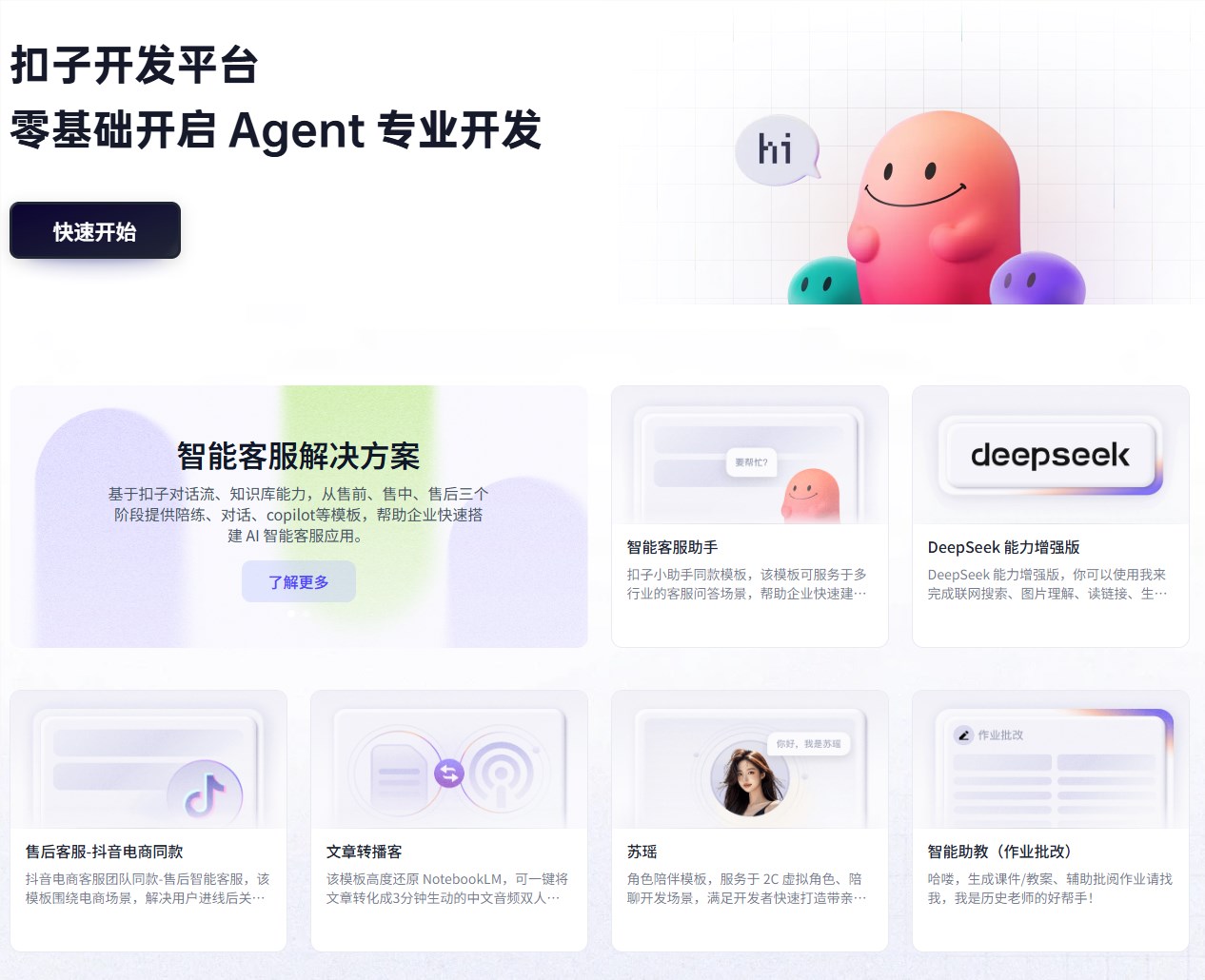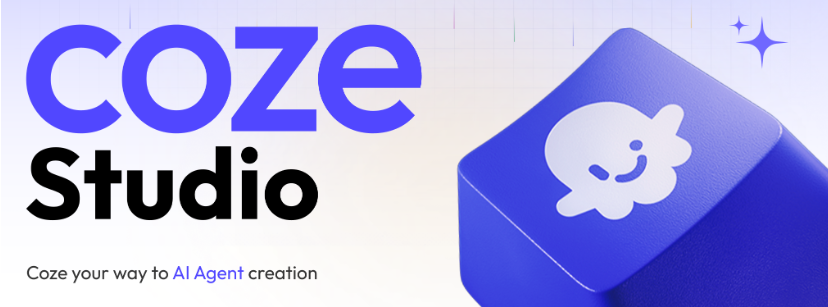AIBase report On July 25, 2025, ByteDance announced the open-sourcing of two core projects of its AI Agent development platform Coze: Coze Studio and Coze Loop. This move has sparked enthusiastic reactions within the global developer community. This open-sourcing not only marks an important step in ByteDance's strategic layout in the AI field, but also provides enterprises and individual developers with low-barrier and highly flexible AI agent development tools.

Background and Strategic Significance of Open Sourcing
Coze is a no-code/low-code AI application and chatbot development platform launched by ByteDance, aiming to allow users to quickly build AI agents and deploy them on multiple platforms, including Discord, WhatsApp, Twitter, and Feishu, without requiring deep programming backgrounds. Since its launch in 2023, Coze has rapidly accumulated a large user base worldwide, thanks to its intuitive drag-and-drop interface, powerful workflow design capabilities, and seamless integration with various large language models (LLMs).
Facing increasingly fierce competition in the AI Agent market, ByteDance chose to open-source the core components of Coze in July 2025, sending a strong signal: by opening up technology and ecosystems, it aims to lower the barriers to AI development and promote industry innovation. Industry experts believe this is a "milestone in the AI Agent development field," meeting enterprise demands for data privacy and customization, and providing opportunities for personal developers to learn and innovate.
Overview of the Open Source Projects
The two open-sourced projects are as follows:


Coze Studio: A visual AI Agent development platform that allows users to build complex workflows through drag-and-drop nodes, integrating large language models, plugins, and knowledge bases, suitable for rapid development and deployment of AI applications. Project URL: https://github.com/coze-dev/coze-studio
Coze Loop: A platform focused on the full lifecycle management of AI Agents, covering functions such as prompt debugging, performance evaluation, and monitoring, helping developers optimize the performance of their agents. Project URL: https://github.com/coze-dev/cozeloop
Both projects use the Apache 2.0 open source license, allowing individuals and enterprises to freely use, modify, or even commercialize the deployment, greatly lowering the usage barrier with this permissive license.
Technical Architecture and Core Features
Coze Studio: The Tool for Building AI Agents from 0 to 1
Coze Studio is a development platform based on large language models, with a backend developed using Golang, and a frontend developed using React + TypeScript, following domain-driven design (DDD) principles, resulting in a clear architecture that is easy to develop further. Its core features include:
Visual Workflow Orchestration: Through a drag-and-drop interface, users can connect nodes such as large language models, plugins, and knowledge bases to quickly build complex business logic. Developers can set up a multimodal customer service robot within 30 minutes.
Containerized Deployment: Supports Docker Compose deployment, including coze-server, database, Redis, and Elasticsearch, ensuring environmental consistency and horizontal scalability. It can run with as little as 2 cores and 4GB memory, suitable for small and medium-sized enterprises and individual developers.
Flexibility in Model Configuration: Supports multiple models (such as OpenAI, Volcano Fangzhou, etc.), with model IDs and API keys configured via YAML files, allowing developers to switch models according to their needs.
Plugin Ecosystem: Although the number of plugins in the open-source version is less than in the cloud version, it supports developers in writing their own plugins to expand functionality.
The deployment process of Coze Studio is very simple, and the official documentation provides detailed guidance:
# Clone the source code git clone https://github.com/coze-dev/coze-studio.git # Enter the project directory cd coze-studio # Copy the model configuration template cp backend/conf/model/template/model_template_ark_doubao-seed-1.6.yaml backend/conf/model/ark_doubao-seed-1.6.yaml # Configure model parameters vim backend/conf/model/ark_doubao-seed-1.6.yaml # Start the service cd docker cp .env.example .env docker compose --profile '*' up -d
After deployment, users can access http://localhost:8888/ through a browser to experience the full functionality of Coze Studio.
Coze Loop: The Optimization Tool from 1 to 100
Coze Loop focuses on the debugging and optimization of AI Agents, solving pain points in the development process. Its main features include:
- Full-Chain Visibility: Visualizes the entire process from user input to AI output, displaying intermediate results of model calls and tool executions, improving debugging efficiency.
- Systematic Evaluation: Provides an automated evaluation module to test and optimize agents from dimensions such as accuracy and compliance.
- Multi-language SDKs: Supports Go, Python, Java, and other languages, making it convenient for developers to integrate optimization features into existing systems.
The open-sourcing of Coze Loop offers developers an opportunity to deeply learn about Prompt engineering, especially for enterprise users who need fine-tuning of agent performance.
Strategic Considerations Behind the Open Sourcing
ByteDance's open sourcing is considered a carefully thought-out strategic move, rather than a simple technical sharing. Analysis suggests that there are several motivations behind the open sourcing:
Embracing Private Deployment Needs: Many enterprises have strict requirements for data privacy and compliance. The open-source version of Coze Studio supports local deployment, meeting these needs and opening the door to the enterprise market for Coze.
Driving Ecosystem Development: Through the Apache 2.0 license, ByteDance encourages community contributions of code and plugins, enriching the Coze ecosystem. Innovation from the open-source community feeds back into the commercial version, creating a virtuous cycle between commercial and open-source efforts.
Lowering Development Barriers: The AI Agent market is shifting from workflow-based models to autonomous Agent models. Open-sourcing Coze Studio and Coze Loop lowers the development barrier, enabling more developers to quickly build AI applications.
Learning and Competition: Open-sourcing the complete technical architecture allows developers to deeply learn how enterprise-level AI applications are implemented, while also differentiating itself from competitors like Dify and FastGPT.
Industry developers commented: "Coze's open source can basically complete all common Agent applications with the entire solution, both front-end and back-end, and supports adding new capabilities flexibly, which benefits small companies."
Analysis of Advantages and Limitations
Advantages
Low-Barrier Development: The visual interface of Coze Studio and the debugging tools of Coze Loop allow non-technical users to get started quickly, building a fully functional agent within 30 minutes.
Flexible Private Deployment: Supports Docker containerized deployment, suitable for enterprises sensitive to data privacy.
Community-Driven Innovation: The Apache 2.0 license encourages community contributions, potentially leading to more plugins and application scenarios in the future.
Integration with ByteDance Ecosystem: Coze can seamlessly integrate with ByteDance's platforms such as Douyin and Feishu, enhancing its competitiveness in the domestic market.
Limitations
Limited Plugin Ecosystem: The number of plugins in the open-source version is less than in the cloud version, requiring developers to create their own to expand functionality.
Lack of Multi-Tenant Support: The current open-source version only supports a single-account system and does not support multi-user collaboration or workflow sharing, falling short compared to Dify.
Deployment Complexity: Although the documentation is detailed, the initial deployment involves container configuration, which may still be challenging for novice users.
Performance Gap: The performance of the locally deployed version may lag behind the cloud version, especially in handling complex tasks.
Competitive Comparison Analysis
Coze's open sourcing directly positions it against intelligent agent development platforms like Dify and FastGPT. Here are the key differences among the three:
| Platform | Private Deployment | Multi-Tenant Support | Plugin Ecosystem | Technology Stack | Applicable Scenarios |
|---|---|---|---|---|---|
| Coze Studio | Supported | Not Supported | Weaker, requires self-development | Golang+React | Quickly build, customized enterprise applications |
| Dify | Supported | Supported | Rich | Python+Node | Team collaboration, standardized LLMOps |
| FastGPT | Supported | Supported | Moderate | Community-driven | Knowledge engineering, lightweight applications |
- Dify: Known for standardizing LLMOps, supports multi-tenancy and application sharing, suitable for teams needing collaboration.
- FastGPT: Represents open-source community knowledge engineering practices, suitable for lightweight scenarios, but lacks depth compared to Coze.
- Coze: With ByteDance's computing power and traffic resources, it emphasizes scenario-based implementation efficiency, especially suitable for rapid prototyping and local deployment.
Some opinions state: "Coze is a benchmark that started early, but mainly serves professional users in building workflows, taking a different path from later autonomous AI Agent platforms."
Community Reactions and Future Outlook
After the release of Coze's open sourcing, the Coze Studio project on GitHub quickly received over 1100 stars, showing developers' high enthusiasm. Discussions on social media were also very active, with experts stating: "The open sourcing of Coze Studio and Coze Loop provides developers with a full-chain tool from development to optimization, truly changing the rules of the game in AI Agent development."
However, some developers expressed cautious attitudes, noting that Coze had previously claimed open-sourcing but only opened part of the features, and whether this open-sourcing will truly fulfill its promises remains to be seen.
In the future, the Coze open-source project is expected to continue evolving in the following directions:
- Expansion of the Plugin Ecosystem: Through community contributions, enrich the plugin library of the open-source version, narrowing the gap with the cloud version.
- Multi-Tenant Support: Add multi-user collaboration features to enhance the practicality of enterprise applications.
- Cross-Platform Federated Architecture: Explore interoperability with platforms like Dify and FastGPT, forming a unified AI Agent development standard.
Conclusion
ByteDance's open sourcing of Coze Studio and Coze Loop is a strategically significant move, demonstrating its ambitions in the AI field and providing developers with powerful tools to build and optimize AI Agents. Through visual development, containerized deployment, and full lifecycle management, Coze lowers the barriers to AI development, particularly suitable for small and medium-sized enterprises and individual developers.
Although there are still shortcomings in the plugin ecosystem and multi-tenant support, the Apache 2.0 license and ByteDance's ecosystem resources lay a solid foundation for Coze's future development. As industry professionals stated: "Coze's open sourcing is not just the opening of tools, but also the sharing of a complete AI Agent development system, benefiting both individuals and enterprises."
For AI enthusiasts and professionals, Coze's open sourcing is an opportunity worth exploring in depth. Whether learning enterprise-level architecture or quickly building innovative applications, Coze opens a new door for developers.
Related Links:
- Coze Studio GitHub: https://github.com/coze-dev/coze-studio
- Coze Loop GitHub: https://github.com/coze-dev/cozeloop

